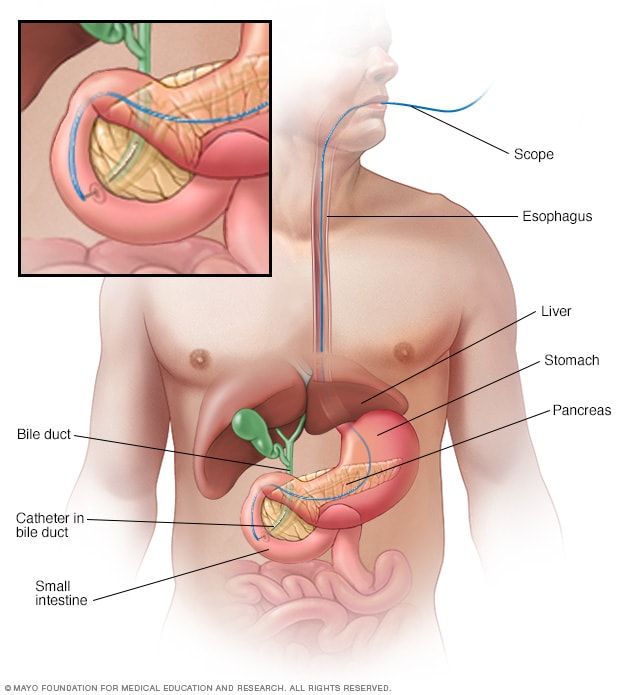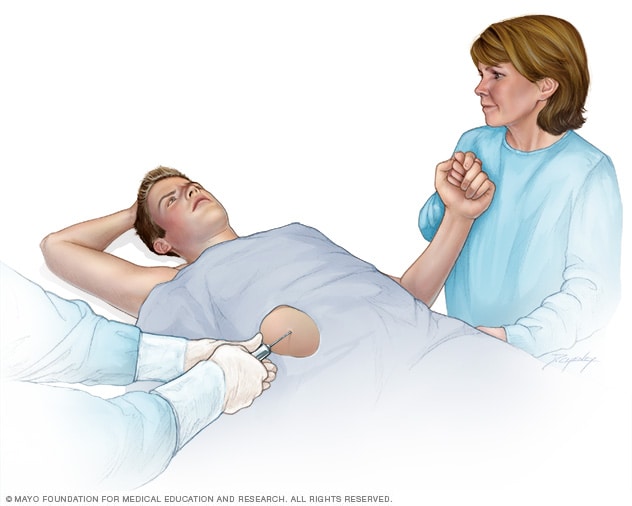Diagnosis
Endoscopic retrograde cholangiopancreatography

Endoscopic retrograde cholangiopancreatography
Endoscopic retrograde cholangiopancreatography (ERCP) uses a dye to highlight the bile ducts on X-ray images. A thin, flexible tube with a camera on the end, called an endoscope, goes through the throat and into the small intestine. The dye enters the ducts through a small hollow tube, called a catheter, passed through the endoscope. Tiny tools passed through the catheter also can be used to remove gallstones.
Liver biopsy

Liver biopsy
A liver biopsy is a procedure to remove a small sample of liver tissue for laboratory testing. A liver biopsy is commonly performed by inserting a thin needle through the skin and into the liver.
Tests and procedures used to diagnose primary sclerosing cholangitis include:
- Liver function blood test. A blood test to check your liver function, including levels of your liver enzymes, can give your doctor clues about your diagnosis.
- MRI of your bile ducts. Magnetic resonance cholangiopancreatography (koh-lan-jee-o-pan-cree-uh-TOG-ruh-fee) uses magnetic resonance imaging (MRI) to make images of your liver and bile ducts and is the test of choice to diagnose primary sclerosing cholangitis.
-
X-rays of your bile ducts. A type of bile duct X-ray called endoscopic retrograde cholangiopancreatography (ERCP) in addition to, or instead of, an MRI may be needed. But this test is rarely used for diagnosis because of the risk of complications.
To make your bile ducts visible on an X-ray, your doctor uses a flexible tube passed down your throat to inject dye into the area of your small intestine where your bile ducts empty.
An ERCP is the test of choice if signs and symptoms persist despite no abnormalities on an MRI. An ERCP is often the initial test if you're unable to have an MRI because of a metal implant in your body.
-
Liver biopsy. A liver biopsy is a procedure to remove a piece of liver tissue for laboratory testing. Your doctor inserts a needle through your skin and into your liver to extract a tissue sample.
A liver biopsy can help determine the extent of damage to your liver. The test is used only when the diagnosis of primary sclerosing cholangitis is still uncertain after less-invasive tests.
More Information
Treatment
Treatments for primary sclerosing cholangitis focus on managing complications and monitoring liver damage. Many medications have been studied in people with primary sclerosing cholangitis, but so far none have been found to slow or reverse the liver damage associated with this disease.
Treatment for itching
- Bile acid sequestrants. Medications that bind to bile acids — the substances thought to cause itching in liver disease — are the first line treatment for itching in primary sclerosing cholangitis.
- Antibiotics. If you have trouble tolerating a bile acid-binding drug or if it doesn't help, your doctor may prescribe rifampin (Rifadin, Rimactane, others), an antibacterial drug. Exactly how rifampin reduces itching is unknown, but it may block the brain's response to itch-inducing chemicals in your circulation.
-
Antihistamines. This type of medication may help reduce mild itching caused by primary sclerosing cholangitis. Whether these medications are effective for this condition is unknown.
Antihistamines may worsen the liver disease symptoms of dry eyes and dry mouth. On the other hand, antihistamines can help with sleep if itching keeps you awake.
- Opioid antagonists. Itching related to liver disease may also respond to opioid antagonist drugs, such as naltrexone. Like rifampin, these drugs seem to reduce the itch sensation by acting on your brain.
- Ursodeoxycholic acid (UDCA). Also known as ursodiol, UDCA is a naturally occurring bile acid that may help relieve itching symptoms caused by liver disease by increasing the absorbability of bile.
Treatment for infections
Bile that backs up in narrowed or blocked ducts causes frequent bacterial infections. To prevent and treat these infections, people with primary sclerosing cholangitis may take repeated courses of antibiotics or continue taking antibiotics for long periods.
Before any procedure that could cause an infection, such as an endoscopic procedure or abdominal surgery, you'll also need to take antibiotics.
Nutrition support
Primary sclerosing cholangitis makes it difficult for your body to absorb certain vitamins. Even though you may eat a healthy diet, you may find that you can't get all the nutrients you need.
Your doctor may recommend vitamin supplements that you take as tablets or that you receive as an infusion through a vein in your arm. If the disease weakens your bones, you may take calcium and vitamin D supplements as well.
Treatment for bile duct blockages
Blockages that occur in your bile ducts may be due to disease progression but can be a sign of cancer of the bile duct. Endoscopic retrograde cholangiopancreatography (ERCP) can help determine the cause, and bile duct blockage can be treated with:
- Balloon dilation. This procedure can open blockages in the larger bile ducts outside the liver. In balloon dilation, your doctor runs a slender tube with an inflatable balloon at its tip (balloon catheter) through an endoscope and into a blocked bile duct. Once the balloon catheter is in place, the balloon is inflated.
- Stent placement. In this procedure, your doctor uses an endoscope and attached instruments to place a small plastic tube called a stent in a blocked bile duct to hold the duct open.
Liver transplant
A liver transplant is the only treatment known to cure primary sclerosing cholangitis. During a liver transplant, surgeons remove your diseased liver and replace it with a healthy liver from a donor.
A liver transplant is reserved for people with liver failure or other severe complications of primary sclerosing cholangitis. Though uncommon, it's possible for primary sclerosing cholangitis to recur after a liver transplant.
Clinical trials
Explore Mayo Clinic studies testing new treatments, interventions and tests as a means to prevent, detect, treat or manage this condition.
Lifestyle and home remedies
If you've been diagnosed with primary sclerosing cholangitis, take steps to care for your liver, such as:
- Don't drink alcohol.
- Get vaccinated against hepatitis A and B.
- Use care with chemicals at home and at work.
- Maintain a healthy weight.
- Follow directions on all medications, both prescription and over-the-counter. Make sure your pharmacist and any doctor prescribing for you know that you have a liver disease.
- Talk to your doctor about any herbs or supplements you're taking since some can be harmful to your liver.
Alternative medicine
No alternative medicine treatments have been found to treat primary sclerosing cholangitis. But some complementary and alternative therapies may help you cope with the signs and symptoms of the disease. Talk to your doctor about your options.
Fatigue is common in people with primary sclerosing cholangitis. While doctors can treat some factors that may contribute to fatigue, your signs and symptoms may persist. You might find relief with complementary and alternative treatments that have shown some benefit for fatigue, such as:
- Regular exercise done more than two hours before you go to bed, which can help promote better sleep
- A well-balanced diet that includes fruit, vegetables, whole grains and protein
- Stress management techniques, such as meditation and relaxation exercises
Preparing for your appointment
Start by seeing your primary care doctor if you have signs or symptoms that worry you. If your doctor suspects you may have primary sclerosing cholangitis, you may be referred to a liver specialist (gastroenterologist or hepatologist).
Because appointments can be brief and because there's often a lot of ground to cover, it's a good idea to be well-prepared. Here's some information to help you get ready and what to expect from your doctor.
What you can do
- Be aware of any pre-appointment restrictions. When you make your appointment, be sure to ask if there's anything you need to do in advance, such as restrict your diet.
- Write down any symptoms you're experiencing, including any that may seem unrelated to the reason for which you scheduled the appointment.
- Write down key personal information, including any major stresses or recent life changes.
- Make a list of all medications, as well as any vitamins or supplements, that you're taking.
- Consider taking a family member or friend along. Sometimes it can be difficult to remember all the information provided during an appointment. Someone who accompanies you may remember something that you missed or forgot.
- Write down questions to ask your doctor.
Your time with your doctor is limited. You may feel less rushed if you make a list of questions you want to ask at your appointment. Here are some possible questions about primary sclerosing cholangitis:
- Can you explain my test results to me?
- Will I need more tests?
- How far has my primary sclerosing cholangitis progressed?
- How severe is the damage to my liver?
- Can you estimate when I may need a liver transplant?
- What treatments can relieve my signs and symptoms?
- What are the potential side effects of each treatment?
- Should I be tested for inflammatory bowel disease?
- What signs and symptoms signal that my condition is worsening and I need to make another appointment?
- Are there any restrictions that I need to follow?
- Should I see a specialist?
- Are there any brochures or other printed material that I can take with me? What websites do you recommend?
In addition to the questions that you've prepared to ask your doctor, don't hesitate to ask questions that come up during your appointment.
What to expect from your doctor
Your doctor is likely to ask you a number of questions. Being ready to answer them may allow more time later to cover points you want to address. Your doctor may ask:
- When did you begin experiencing symptoms?
- Have your symptoms been continuous or occasional?
- How severe are your symptoms?
- What, if anything, seems to improve your symptoms?
- What, if anything, appears to worsen your symptoms?
- Do you have frequent bouts of diarrhea?
- Have you noticed blood in your stool?